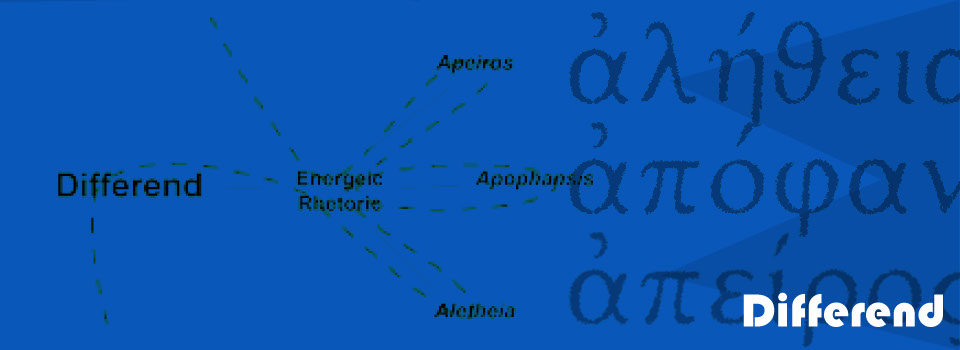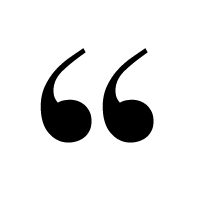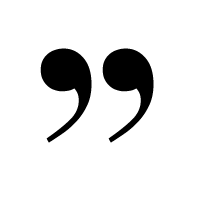
x
Contents
Home
Home
Home

Apeiros
In the earliest surviving fragment of Greek philosophy, Anaximander introduces the concept of to apeiron, “the infinite” (Barnes 28ff). Jonathan Barnes sums up Anaximander’s “Urstoff” (original material out of which all things came) like this: “The first principle or element of things, the original and originating mass of the universe, was apeiros, unlimited” (29). This seemingly simple limitlessness is complicated by the realization that originary is in itself a limit (whence Lyotard’s pseudarchè). As such, Anaximander’s apeiron prefigures Derrida’s shocking statement that “différance, in a certain and very strange way, (is) ‘older’ than the ontological difference or than the truth of Being” (22). The limitless is a necessary precursor to a world predicated upon limitation (differentiation). Through calling attention to the fundamental limiting inherent in epistemology and language, the Milesian Anaximander may have posthumously influenced the Ephesian Heraclitus.
That Heraclitus may be making a sidelong reference to Anaximander in his opening fragment has, to my knowledge, gone unnoticed. Heraclitus’s opening fragment reads,
Although this account [logos] holds forever, men ever fail to comprehend, both before hearing it and once they have heard. Although all things come to pass in accordance with this account, men are like the untried [apeiron] when they try [peiromenoi] such words and works as I set forth, distinguishing each according to its nature and telling how it is. But other men are oblivious of what they do awake, just as they are forgetful of what they do asleep. (Heraclitus and Kahn K.1, D.1)
While the first word, logos, is one of the most recognizable of Greek words, the other two may be gleaned from our introduction to to apeiron—the first (apeiroi) being the masculine plural version of the same word, the second (peiromenoi) being a verbal form lacking the negative prefix. However, the question might arise as to what (in)experience has to do with infinity. To answer that, we must trace the history of the infinite.
Liddell and Scott’s Intermediate Greek-English Lexicon records three separate words (n.b. not meanings) spelled apeiros. The first is a Doric version of epeiros (i.e. epeiros is (mis)spelled apeiros), meaning “land” (as opposed to sea or air). The second is defined as “without trial or experience” and traced to peira. The third, defined as “boundless, infinite, countless,” is traced to peiras. The latter two of these words are negative forms of a word (peira) that means an “attempt or try” and related forms include the idea of piercing or passing over, hence limit. The apeiros therefore means “without either experience or limit.” This particular word cluster descends into experiment, empiric, pirate (one who makes an attempt), emporium (either a place of attempts or a meeting of limits), port, and experience (Hasley §296-97).
Apparently the word originally connoted testing something by poking at it. Hence it would evolve notions of limit (determined by trial), experience, and piercing. Somewhere behind all this lurks Robert Pirsig’s notion of the rhetorical scalpel, which establishes limits—and thereby determines experience—by piercing the Urstoff. The concept of to apeiron becomes incredibly productive then for Anaximander, but it remains to be shown why Heraclitus would invoke a word with such semantic weight. Perhaps its ambiguity is indicative of Heraclitus’s sibylline style which, “oute legei oute kruptei alla semainei" (Heraclitus and Kahn fragment 93).
This punning signification should be allowed only if productive. Seemingly, Heraclitus’ use would be just the opposite—why would Heraclitus link his inexperienced listeners with Anaximander’s Urstoff? Perhaps it was an insult to Anaximander (long dead by this point). Perhaps an attempt to separate himself from Anaximander’s empiric followers. I would, however, argue that much more is at stake than a twenty-five-hundred-year-old squabble.
Heraclitus’s first sentence plays with the word logos. Normally the phrase this logos would refer to the book itself—a sort of proem preparing the reader for what is to come. Yet by claiming both that “this [logos] holds forever” and that men fail to understand it both “before hearing it and once they have heard,” Heraclitus points toward a more elegant reading of logos (Heraclitus and Kahn 96-97). Rather than being a mere account or argument, it is the discourse of nature itself, possibly language itself. As Kahn writes,
The tension between word and content is essential here, for without it we do not have the instructive paradox of men who are expected to understand a logos they have not heard. (Heraclitus and Kahn 98)
Playing between medium and message, Heraclitus unites them (and this over two millennia before Marshall McLuhan). The logos is not only the structure of his book but the argument itself: both form and content.
The careful wording of the next sentence (really still the first in the Greek) sets up a delicate play between experience and empiricism. The statement that “all things come to pass in accordance with this account” once again plays toward the new science that had been brewing in Miletus—a blend between philosophy and protoempiricism (empiricism also being related to peira). Heraclitus is quick to challenge such a reading by saying that “men are like the untried [apeiroi] when they try [peiromenoi] such words and works as I set forth, distinguishing each according to its nature [phusis] and telling how it is.” Again the idea of physis (as opposed to nomos), common in the new science, rears its ugly head, promising a simple resolution. Instead, the subtle phrasing of the central section yields more complex readings. The complexity hinges upon the word like. Kahn calls this “a surprising phrase; for it suggests that in fact men do have the experience in question” (Heraclitus and Kahn 99). This problem may be dis-solved through the implementation of Kahn’s earlier argument about the logos: if it is universal and originary, then all have experienced it already.
Finally we have reached the apeirotic. The aporia is made evident in the central phrase:
apeiroisin eoikasi peiromenoi
They are like the inexperienced [or limitless ones] even as they experience. (My trans.)
Fortuitously the congruence between the two terminal words in this phrase appears, granting it a certain harmony in its paradox. If we invert our usual interpretation, we find that people are like the apeiron itself when they experience the logos. As we learn to listen to the logos, we find that form and content merge. Rather than Heraclitus’s statement being about the logos, it becomes a part of the logos. As we study the structure of language, we find that we are also an expression of language rather than only the reverse. Rhetoric is ecological or ambient.
Always already returning to us we see Plato’s notion of rhetoric as experience (empeiria) rather than art (Phaedrus 462 C). Plato calls rhetoric a “made art” and when asked by Polus of his meaning replies, “I mean a certain habitude [empeiria]” (Lamb’s trans.). Empeiria, as you may have guessed, stems from the same root as apeiros. Concordantly, it provides a useful analog to Heraclitus. Rhetoric is indeed an experience—an experience in the infinite, boundless Urstoff from which reality is constructed: a discourse on the figural. Heraclitus somehow manages to inform Plato’s disparaging remarks about rhetoric even after his death. Deleuze and Guattari recognize that the immanence of the rhetorical subject lies in its existence as habit:
Empiricism knows only events and other people and is therefore a great creator of concepts. Its force begins from the moment it defines the subject, a habitus, a habit, nothing but a habit in a field of immanence, the habit of saying I. (What Is Philosophy? 48)
Rhetoric is an experience that yields infinite inexperience. By looking through language, rather than at it, people “are oblivious of what they do awake, just as they are forgetful of what they do asleep.” This epistemological somnambulism reflects a public incapable of laughing at/with the sesquipedalian philosophizing in which these etymological asides revel. Instead the demand is to “be clear,” a notion as dishonest as it is impossible. Hopefully this project has found its way into the hands of a reader who glances off of it rather than staring it in the face. Only in this manner can it provide sufficient misreadings to merit its own creation.

Neither states nor lies but signifies.
(Heraclitus, fragment 93; my trans.)
land
without experience
boundless

❰ Energeic Rhetoric

